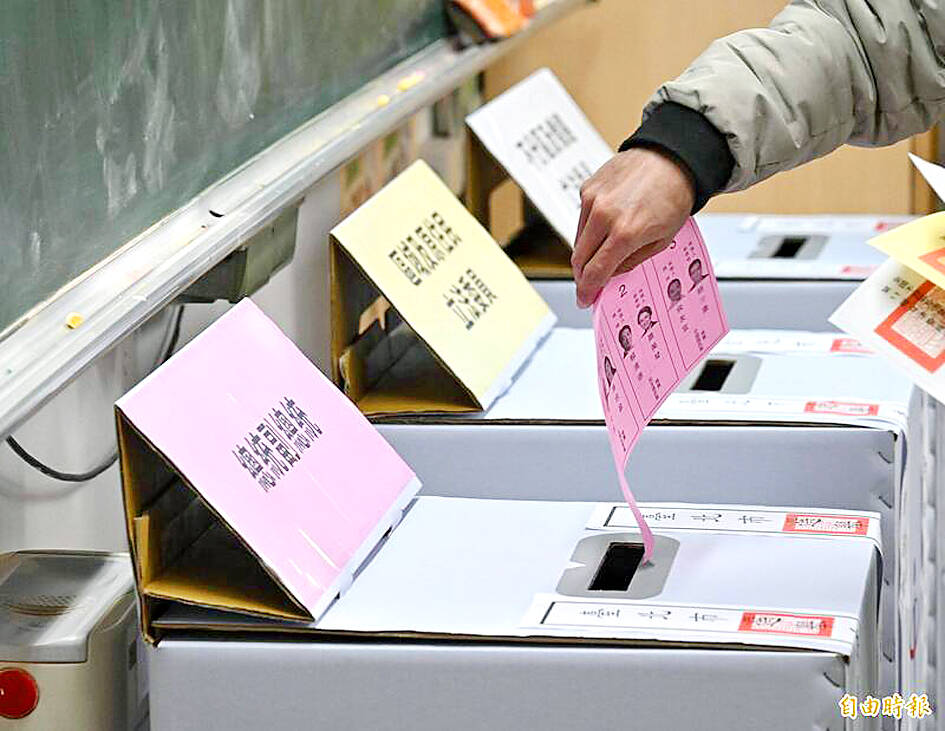The Central Election Commission (CEC) has been named a founding member of the Artificial Intelligence Advisory Group on Elections (AI AGE) launched on Thursday by the International Foundation for Electoral Systems (IFES) in Washington.
The group includes election officials and technology experts from countries including Ukraine, Brazil, Indonesia and Kenya, with Taiwan the only representative from East Asia.
Cyber ambassador Audrey Tang (唐鳳), who is also the former minister of digital affairs, is a founding member of the group, and serves in a technologist role.

Photo: Taipei Times
“Those in the pay of authoritarian forces are undermining electoral processes, weaponizing [artificial intelligence] AI and employing our societal strengths against us,” Tang said.
However, Taiwan formulated its approach around “pre-bunking” and explaining manipulation tactics without the need to “resort to censorship,” she said.
A democratic approach of “cogoverning AI with the people” is the way forward, she added.
It is “crucial that AI is trained to serve the greater good, while unlocking our collective wisdom and building a more accountable and participatory digital society,” Tang said.
IFES Global Digital Democracy Advisor Lisa Poggiali said that Taiwan has been at the “forefront of so many interesting Digital Democracy initiatives.”
The Taiwan model is “valuable,” because it thinks about “ethical and human rights oriented conversation, and security conversations from the beginning in the educational system,” she said.
The IFES has worked in more than 145 countries since 1987, “building resilient democracies that deliver for everyone,” its Web site says.
The AI AGE would address key issues at the intersection of AI and elections, including biometric identification, data governance, content authenticity and information integrity, the group’s launch video said.

CHAOS: Iranians took to the streets playing celebratory music after reports of Khamenei’s death on Saturday, while mourners also gathered in Tehran yesterday Iranian Supreme Leader Ayatollah Ali Khamenei was killed in a major attack on Iran launched by Israel and the US, throwing the future of the Islamic republic into doubt and raising the risk of regional instability. Iranian state television and the state-run IRNA news agency announced the 86-year-old’s death early yesterday. US President Donald Trump said it gave Iranians their “greatest chance” to “take back” their country. The announcements came after a joint US and Israeli aerial bombardment that targeted Iranian military and governmental sites. Trump said the “heavy and pinpoint bombing” would continue through the week or as long

TRUST: The KMT said it respected the US’ timing and considerations, and hoped it would continue to honor its commitments to helping Taiwan bolster its defenses and deterrence US President Donald Trump is delaying a multibillion-dollar arms sale to Taiwan to ensure his visit to Beijing is successful, a New York Times report said. The weapons sales package has stalled in the US Department of State, the report said, citing US officials it did not identify. The White House has told agencies not to push forward ahead of Trump’s meeting with Chinese President Xi Jinping (習近平), it said. The two last month held a phone call to discuss trade and geopolitical flashpoints ahead of the summit. Xi raised the Taiwan issue and urged the US to handle arms sales to

State-run CPC Corp, Taiwan (CPC, 台灣中油) yesterday said that it had confirmed on Saturday night with its liquefied natural gas (LNG) and crude oil suppliers that shipments are proceeding as scheduled and that domestic supplies remain unaffected. The CPC yesterday announced the gasoline and diesel prices will rise by NT$0.2 and NT$0.4 per liter, respectively, starting Monday, citing Middle East tensions and blizzards in the eastern United States. CPC also iterated it has been reducing the proportion of crude oil imports from the Middle East and diversifying its supply sources in the past few years in response to geopolitical risks, expanding

Pro-democracy media tycoon Jimmy Lai’s (黎智英) fraud conviction and prison sentence were yesterday overturned by a Hong Kong court, in a surprise legal decision that comes soon after Lai was jailed for 20 years on a separate national security charge. Judges Jeremy Poon (潘兆初), Anthea Pang (彭寶琴) and Derek Pang (彭偉昌) said in the judgement that they allowed the appeal from Lai, and another defendant in the case, to proceed, as a lower court judge had “erred.” “The Court of Appeal gave them leave to appeal against their conviction, allowed their appeals, quashed the convictions and set aside the sentences,” the judges